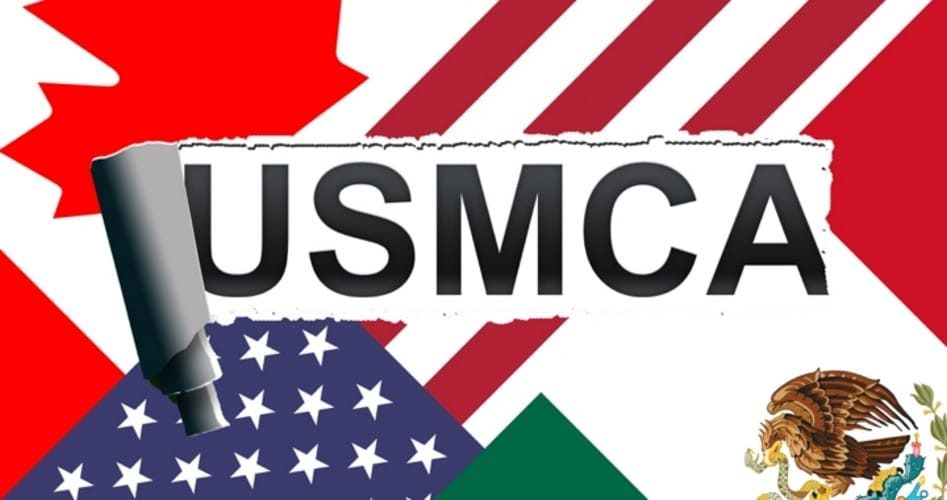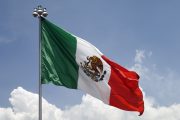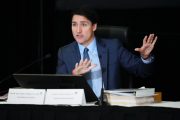
On December 13, 2019, House Majority Leader Steny Hoyer (D-Md.) and House Minority Leader Kevin McCarthy (R-Calf.) introduced the USMCA Implementation Act (H.R. 5430). Officially entitled “To implement the Agreement between the United States of America, the United Mexican States, and Canada attached as an Annex to the Protocol Replacing the North American Free Trade Agreement,” and also known by its short title “United States-Mexico-Canada Agreement Implementation Act,” the 239-page bill would both approve and implement the now-2,410-page USMCA trade scheme. Despite the bill’s rare bipartisan fanfare, below are five reasons to oppose H.R. 5430.
Reason No. 1: Above U.S. and State Law
The USMCA Implementation Act would make federal, state, and personal sovereignty subservient to the USMCA. Section 102, entitled “Relationship of the USMCA to United States and State Law,” explicitly states: “No provision of the USMCA, nor the application of any such provision to any person or circumstance, which is inconsistent with any law of the United States, shall have effect.” However, that is only true until Congress changes any federal law that might be in conflict with the USMCA.
In the name of freeing world — or, as with the USMCA, regional — trade, Congress will simply change any federal laws that are in conflict with the USMCA, much like when Congress overturned its Country of Origin Label (COOL) laws for meat products sold in the United States. The World Trade Organization had ruled against the United States’ Country of Origin Labels in a suit initially brought before the global regulatory body by Mexico and Canada. Mexico and Canada claimed that COOL harmed the sale of their beef and pork products sold in the United States, and Congress overturned COOL to bring the United States into conformity with the regional trade regime.
While the implementation bill states that no provision of the USMCA that is in conflict with U.S. law will have effect, the whole purpose of the H.R. 5430 is to change U.S. law in order to be in compliance with the USMCA once the bill is enacted. Section 102 of H.R. 5430 states, “Nothing in this Act shall be construed — (A) to amend or modify any law of the United States, or (B) to limit any authority conferred under any law of the United States, unless specifically provided for in this Act.” (Emphasis added.)
Regarding state laws, Section 102 goes on to explain, “No State law, or the application thereof, may be declared invalid as to any person or circumstance on the ground that the provision or application is inconsistent with the USMCA, except in an action brought by the United States for the purpose of declaring such law or application invalid.” (Emphasis added.)
In other words, no state law will be declared invalid until the federal government takes action to make it so! This makes the federal government subservient to the interests of the USMCA, acting as a police enforcer against the states on behalf of the regional integration scheme.
Section 102 also states, with respect to “private remedies” or individuals, “No person other than the United States […] shall have any cause of action or defense under the USMCA or by virtue of congressional approval thereof; or […] may challenge, in any action brought under any provision of law, any action or inaction by any department, agency, or other instrumentality of the United States, any State, or any political subdivision of a State, on the ground that such action or inaction is inconsistent with the USMCA.” In other words, no person can defend themselves from the USMCA, nor is any person, under any method, allowed to sue the USMCA. To put it succinctly, the USMCA is above the law and you!
Reason No. 2: Supranational Bureaucracy
H.R. 5430 contains nothing to protect American sovereignty from the creation of an unaccountable regional bureaucracy that will operate above the jurisdiction of the federal government. Chapter 30 of the USMCA establishes the Free Trade Commission, which will supervise a total of 19 committees and various sub-committees that are subordinate to that commission. The primary 19 committees can be found in the various chapters of the USMCA, corresponding to their particular subject or area; for example:
• Article 2.17 in Chapter 2 establishes the “Committee on Trade in Goods”;
• Article 3.7 in Chapter 3 establishes the “Committee on Agricultural Trade”;
• Article 5.18 in Chapter 5 establishes the “Committee on Rules of Origin and Origin Procedures”;
• Article 6.8 in Chapter 6 establishes the “Committee on Textile and Apparel Trade Matters”;
• Article 7.24 in Chapter 7 establishes the “Committee on Trade Facilitation”;
• Article 9.17 in Chapter 9 establishes the “Committee on Sanitary and Phytosanitary Measures”;
• Article 11.11 in Chapter 11 establishes the “Committee on Technical Barriers to Trade,” also known as the TBT Committee;
• Article 13.21 in Chapter 13 establishes the “Committee on Government Procurement”;
• Annex 15-B in Chapter 15 establishes the “Committee on Transportation Services,” also known as the Transportation Services Committee;
• Article 17.19 in Chapter 17 establishes the Committee on Financial Services;
• Article 18.27 in Chapter 18 establishes the “Telecommunications Committee”;
• Article 20.14 in Chapter 20 establishes the “Committee on Intellectual Property Rights,” also known as the IPR Committee;
• Article 22.12 in Chapter 22 establishes the “Committee on State-Owned Enterprises and Designated Monopolies,” also known as the SOE Committee;
• Article 24.26 in Chapter 24 establishes the “Environment Committee”;
• Article 25.4 in Chapter 25 on “Small and Medium-Sized Enterprises” establishes the “Committee on SME Issues,” also known as the SME Committee;
• Article 26.1 in Chapter 26 establishes the “North American Competitiveness Committee,” also known as the Competitiveness Committee;
• Article 28.18 in Chapter 28 establishes the “Committee on Good Regulatory Practices,” also known as the GRP Committee”;
• Article 31.22 in Chapter 31 establishes an “Advisory Committee on Private Commercial Disputes”; and
• Article 33.6 in Chapter 33 establishes the “Macroeconomics Committee.”
The specific functions for each committee are outlined in their corresponding chapters. All of these committees are to be comprised of representatives from the governments of all three countries. The committees are responsible for overseeing and helping to implement the agreement in their particular area. They will also be tasked with addressing any issues that arise under their area.
Committees will meet regularly or on an annual basis, and they are supposed to help encourage or foster greater cooperation and trade among all three countries in their given areas. Committees can also propose changes or revisions to the chapter in the agreement that corresponds to their area. All of the committees’ work, discussions, findings, and recommendations are to be submitted to the Free Trade Commission for consideration.
According to Article 30.2, the USMCA’s Free Trade Commission is empowered to:
(a) consider matters relating to the implementation or operation of this Agreement;
(b) consider proposals to amend or modify this Agreement;
(c) supervise the work of committees, working groups, and other subsidiary bodies established under this Agreement;
(d) consider ways to further enhance trade and investment between the Parties;
(e) adopt and update the Rules of Procedure and Code of Conduct applicable to dispute settlement proceedings; and
(f) review the roster established under Article 31.8 (Roster and Qualifications of Panelists) every three years and, when appropriate, constitute a new roster.
Giving these powers to the Free Trade Commission makes the USMCA a “living agreement,” thus allowing the Free Trade Commission to change the agreement without the consent of the U.S. Congress. In fact, the agreement completely undermines Congress’ constitutional authority under Article I, Section 8 to regulate trade with foreign nations, such as Mexico and Canada, and to impose tariffs on them should the need arise, as in the case of national security.
According to Article 30.2, the Free Trade Commission would also have the power to consider or adopt any changes to a country’s scheduled tariff commitments by accelerating the elimination of tariffs or by making “adjustments to the Tariff Preferential Levels established in Chapter 6 (Textile and Apparel Goods).”
In addition to those powers, Article 30.2 further empowers the Free Trade Commission to delegate new tasks or responsibilities to its subordinate committees, to either merge or dissolve its subordinate committees, and to ambiguously “develop arrangements for implementing this Agreement,” and get advice from “non-governmental persons or groups” such as the Council on Foreign Relations or academics who advocate for greater North American integration, among other powers.
The USMCA’s Free Trade Commission, along with the 19 committees and various sub-committees, working groups, bi-national panels, and tribunals that it will oversee, is analogous to the European Commission, which presides over the European Union. The European Commission not only proposes legislation, it is also responsible for implementing what the European Parliament passes. Member nations are then expected to rubber-stamp the legislation through their own country’s governments, with each lower government following the chain of command.
With global precedent already set, this is what Americans can expect over time from the Free Trade Commission — as the USMCA gradually evolves into a North American Union, much like the European Union.
Reason No. 3: UN Law of the Sea Treaty
The implementation bill does nothing to protect American sovereignty from language in the USMCA that binds the United States to observing provisions of UN treaties that have not been ratified by the U.S. Senate. Chapter 1 of the USMCA mentions the United Nations Convention on the Law of the Sea (UNCLOS), as does Chapter 24 under “Sustainable Fisheries Management.” According to the UN’s Division of Ocean Affairs and Law of the Sea, which is tasked with administrating the convention, UNCLOS covers “all ocean space,” including everything located on, in, beneath, and above the oceans. Fortunately, the Senate has never ratified the convention. The Constitution requires all treaties to be ratified by the Senate. Article II, Section 2, clause 2 of the Constitution states that the president “shall have Power, by and with the Advice and Consent of the Senate, to make Treaties, provided two thirds of the Senators present concur.”
If Congress passes the USMCA implementing legislation (H.R. 5430) and the president signs it into law, they would be approving everything in the USMCA, including UNCLOS, and would be derelict in their duty to uphold the Constitution. And it is this very dereliction of duty that globalists are counting on in order to make an end-run around the Constitution and U.S. national sovereignty.
Reason No. 4: North American Development Bank
H.R. 5430 authorizes $1.5 billion in taxpayer funds to be allocated for the North American Development Bank (NADB). The NADB was originally created under the 1994 North American Free Trade Agreement (NAFTA). According to the NADB’s website, the “NADB is a binational financial institution established by the Governments of the United States and Mexico to provide financing to support the development and implementation of infrastructure projects, as well as to provide technical and other assistance for projects and actions that preserve, protect or enhance the environment in order to advance the well-being of the people of the United States and Mexico.”
In other words, it’s a joint U.S.-Mexican government bank to fund environmental or infrastructure projects that affect both countries. The NADB will take U.S. taxpayer funds, along with funds from the Mexican government, to pay for a litany of integration and environmental schemes not authorized by the U.S. Constitution. Regarding the NADB’s policy goals, Section 832 of H.R. 5430 states:
To the extent consistent with the mission and scope of the North American Development Bank … the Secretary of the Treasury should direct the representatives of the United States to the Board of Directors of the Bank to … give preference to the financing of projects related to environmental infrastructure relating to water pollution, wastewater treatment, water conservation, municipal solid waste, stormwater drainage, non-point pollution, and related matters. [Emphasis added.]
The NADB may also serve as the forerunner for a much-larger North American Bank that would fund projects designed to further integrate the infrastructure of the United States, Mexico, and Canada in order to more easily facilitate the economic merger of the three countries into an EU-style North American Union.
In fact, the North American Competiveness Committee (Chapter 26 of the USMCA) is to be established with “a view to promoting further economic integration among the Parties [United States, Mexico, and Canada].” Article 26.1, Section 5, further states: “The Competitiveness Committee shall … discuss effective approaches and develop information-sharing activities to support a competitive environment in North America that facilitates trade and investment between the Parties, and promotes economic integration and development within the free trade area.” (Emphasis added.)
Section 547 of H.R. 5430 authorizes the U.S. secretary of the Treasury to “subscribe on behalf of the United States to, and make payment for, 150,000 additional shares of the capital stock of the [North American Development] Bank.” And of the $1.5 billion being paid to the NADB, “$225,000,000 shall be for paid in shares of the Bank; and … $1,275,000,000 shall be for callable shares of the bank.”
Although the implementing legislation does not mention the price for these shares, the NADB’s 2016 annual report indicates that certain shares are valued at $10,000 each. Doing the math, one can conclude that the $1.5 billion is simply the initial costs for American taxpayers. The allocation of more funds is certain to follow if the USMCA implementation legislation is passed and enacted into law.
The NADB will use the $1.5 billion to carry out enforcement of the USMCA’s environmental provisions through various federal agencies, such as the Department of Agriculture, Department of Commerce, Department of Interior, Department of Labor, the Environmental Protection Agency, the U.S. Fish & Wildlife Service, and the National Oceanic and Atmospheric Administration, among others.
Reason No. 5: Open Immigration
The implementation bill also does nothing to mitigate language in the USMCA that looks like a back door to open immigration. Chapter 15 of the USMCA, entitled “Cross-Border Trade in Services,” states that the United States, Mexico, or Canada cannot impose a limitation on the total number of “natural persons” that may be employed in a particular service sector.
Article 15.5 of Chapter 15 of the USMCA states: “No party shall adopt or maintain … a measure that … imposes a limitation on … the total number of natural persons that may be employed in a particular financial service sector or that a financial institution or cross-border service supplier may employ … in the form of numerical quotas or the requirement of an economic needs test.” This opens the door for, say, the radically pro-Marxist government of Mexican President Andrés Manuel López Obrador to sue the U.S. government for restricting the number of employees a “financial institution or cross-border service supplier” may want to bring across the border into the United States.
Furthermore, Article 23.8, under the section labeled “Migrant Workers” in Chapter 23 of the USMCA, requires the United States, Mexico, and Canada to “ensure that migrant workers are protected under its labor laws, whether they are nationals or non-nationals” of the country they are residing in. The term “non-nationals” could easily be applied to not just undocumented aliens or “Dreamers” from Mexico, but also to illegal migrants from non-USMCA countries, such as Guatemala, Honduras, El Salvador, India, or China. In fact, such language could be used to argue in favor of retaining President Barack Obama’s unconstitutional executive action for Deferred Action for Childhood Arrivals, commonly known as DACA. And any adjudication could be outside of the jurisdiction of state and federal courts, including the U.S. Supreme Court, and may instead fall under the “regional jurisdiction” of USMCA bi-national panels for dispute settlement.
Building Globalism by Regionalism
Overall, the USMCA builds upon what NAFTA set out to accomplish when it was first proposed. In 1993, former Secretary of State Henry Kissinger wrote about the then-proposed NAFTA: “What Congress will soon have before it is not a conventional trade agreement but the hopeful architecture of a new international system.” Kissinger further elaborated, “A regional Western Hemisphere Organization dedicated to democracy and free trade would be a first step toward the new world order that is so frequently cited but so rarely implemented.” (Emphasis added.)
Instead of individual, sovereign nation-states, Kissinger’s “new world order” would be comprised of interlocking and overlapping regional economic unions masquerading as “free trade.”
In fact, this is exactly what has taken place in Europe. Over a period of 50 years, what originally began as the six-nation European Coal and Steel Community in 1952, gradually — through a series of numerous trade pacts and treaties — evolved into what is now the European Union, with the signing of the Maastricht Treaty (Treaty on European Union) on February 7, 1992.
The EU’s 28 member nations all share a single flag, capital, passports, foreign and diplomatic service, central bank, currency (with the exception of England), anthem, supreme court, parliament, president (elected by the unaccountable European Commission), and constitution (in the form of the Lisbon Treaty, which has been repeatedly rejected by the people of Europe in various national referenda). The “European experiment” for creating a “United States of Europe” has been heralded by globalists as the model for integrating the world.
Multilateral trade schemes — such the Progressive Agreement for Trans-Pacific Partnership (CPTPP) and Regional Comprehensive Economic Partnership (RCEP); the proposed U.S.-Japan Trade Agreement (USJTA), U.S.-EU trade agreement, and Japan-EU trade agreement; NAFTA; and even the USMCA are intended follow the same pattern of Europe. They are not about free trade in the classical sense, i.e. the simple elimination of tariffs; instead, they are about managing trade by super-national bureaucracies — and are designed to foster economic and eventually political integration at the regional and global levels.
Whereas classical free trade was about eliminating the obstruction or hindrance of government in the realm of commerce, modern “free trade agreements” (FTAs) do the opposite. Modern FTAs empower the role of government, elevate the World Trade Organization as a global regulatory body over trade agreements, and create new regional governance where none previously existed. This is because the actual purpose of such agreements is not simply to lower trade barriers but to raise world government — what Kissinger and many globalists have called the “new world order.”
As such, opposition to modern “free trade agreements” does not constitute a rejection or opposition to the theory of free trade, as espoused by Adam Smith; rather, it is a rejection of managed trade, regional regimentation, and globalism.
Lincoln P. Bloomfield, a long-time State Department apparatchik and member of the pro-one world government Council on Foreign Relations, argued that a unified world government could emerge through customs unions and other regional integration schemes. In 1962, Bloomfield wrote a report entitled A World Effectively Controlled by the United Nations: A Preliminary Survey of One Form of a Stable Military Environment. The report was financed by the State Department and published by the Institute for Defense Analysis. In the report, Bloomfield envisioned “ever-larger units evolv[ing] through customs unions, confederation, regionalism, etc., until ultimately the larger units coalesce under a global umbrella.”
As this article is being written, House Speaker Nancy Pelosi (D-Calif.) is expected to schedule a vote on H.R. 5430 for Thursday, December 19, 2019. Senate Majority Leader Mitch McConnell (R-Ky.) has previously stated that the Senate will not vote on USMCA implementation legislation until after an impeachment trial. While the date of a vote may not be certain in the Senate, the following is certain: When the House of Representatives and Senate vote on H.R. 5430, they will not be voting on a simple “free trade” agreement; this vote may determine the fate of the United States and its longevity as an independent and sovereign nation. A Yea for USMCA is an Yea for regionalism and a globalist world order.
Image: stuartmiles99 via iStock / Getty Images Plus
Related Articles:
U.S., Mexico, and Canada Sign “Progressive” USMCA Regional Government Scheme




